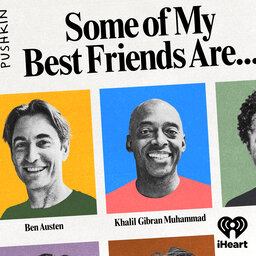Explicit
From Started From the Bottom: How Charlamagne Turned Failure Into Success
Here’s a special episode from a new Pushkin podcast, Started From the Bottom. Host Justin Richmond interviews successful people with humble origins who managed to scale the summit of success – people who grew up on the outside, people of color, people who weren’t part of the old boys’ network. Justin recently sat down with media firebrand Charlamagne Tha God – over his 25 year career, he’s clawed his way to the top of the radio industry. Justin asked the long-time host of The Breakfast Club what it took for him – a young man suffering from anxiety, constantly in and out of jail – to become an icon of modern media. Hear more from Started From the Bottom at apple.co/thebottom.
 Some of My Best Friends Are
Some of My Best Friends Are


